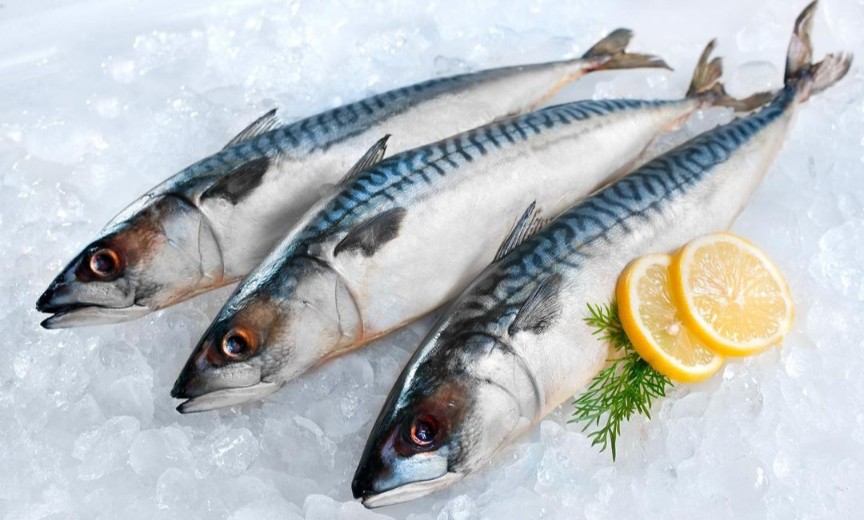Introduction
Kanakatha fish, also known as mackerel, is a beloved seafood delicacy renowned for its rich flavor and numerous health benefits. In this article, we will explore the various facets of this remarkable fish, from its taxonomy to its role in culinary arts and conservation efforts.
What Is Kanakatha Fish?

Mackerel boasts a streamlined body with shimmering, silver-blue skin adorned with distinctive wavy stripes. Its sleek shape enables it to glide effortlessly through the water, making it a fast and agile swimmer.
Nutritional Value of Kanakatha Fish
In our exploration of the fascinating world of Kanakatha fish, or Mackerel, one cannot overlook the impressive nutritional profile that makes this fish a prized addition to many diets. Let’s dive deep into the nutritional value of Kanakatha fish and discover why it’s considered a nutritional powerhouse.
- Rich in Protein
Kanakatha fish is renowned for its high protein content. A 3.5-ounce (100-gram) serving of cooked Mackerel provides approximately 20 grams of protein, making it an excellent source for meeting your daily protein needs. Protein is essential for muscle growth and repair, and Mackerel offers a lean source of this vital nutrient.
- Omega-3 Fatty Acids
One of the standout features of Kanakatha fish is its remarkable Omega-3 fatty acid content, particularly eicosapentaenoic acid (EPA) and docosahexaenoic acid (DHA). These Omega-3s are linked to a multitude of health benefits, including:
- Heart Health: EPA and DHA help reduce the risk of heart diseases by lowering triglycerides, reducing blood clot formation, and lowering blood pressure.
- Brain Function: Omega-3s are crucial for cognitive function and may play a role in preventing cognitive decline as we age.
- Inflammation: They possess potent anti-inflammatory properties, potentially alleviating symptoms of inflammatory conditions.
- Vitamins and Minerals
Kanakatha fish is a good source of several essential vitamins and minerals, including:
- Vitamin B12: Vital for nerve function and the production of red blood cells.
- Selenium: An antioxidant mineral that plays a role in protecting cells from damage.
- Vitamin D: Important for bone health, immune function, and overall well-being.
- Iodine: Essential for thyroid function and hormone production.
- Low in Mercury
While it’s true that some fish can be high in mercury, Kanakatha fish typically falls into the category of low-mercury seafood. This makes it a safe option for regular consumption, even for pregnant women and young children.
- Calories and Fat
While Kanakatha fish is relatively low in calories compared to its high protein and Omega-3 content, it does contain healthy fats. These fats provide a significant source of energy and help the body absorb fat-soluble vitamins like vitamin D.
- Other Nutrients
In addition to the prominent nutrients mentioned above, Kanakatha fish provides a variety of other essential nutrients such as phosphorus, niacin (vitamin B3), and riboflavin (vitamin B2). These nutrients contribute to overall health and well-being.
- Preparing Kanakatha Fish for Maximum Nutritional Benefits
To make the most of the nutritional value of Kanakatha fish, consider various cooking methods such as grilling, baking, or steaming. These methods help retain the fish’s essential nutrients while adding delicious flavor. Avoid deep-frying or excessive use of heavy sauces, as they can add unnecessary calories and diminish the health benefits.
Incorporating Kanakatha fish into your regular diet can be a tasty way to boost your protein intake and reap the numerous health advantages associated with its Omega-3 fatty acids. Whether you enjoy it in a salad, sandwich, or as a main course, this remarkable fish can contribute to your overall health and well-being.
So, the next time you savor a delicious serving of Kanakatha fish, you can relish not only its exceptional taste but also the nutritional treasure it brings to your table.
How to Include Mackerel in Your Diet
Adding Mackerel, also known as Kanakatha fish, to your diet is not only a delicious endeavor but also a smart choice for your health. This versatile fish can be prepared in numerous ways, making it easy to incorporate into your meals. Whether you’re a seafood enthusiast or looking to diversify your diet, here are some tasty and creative ways to enjoy the health benefits of Mackerel:
- Grilled Mackerel
Grilling Mackerel is a fantastic way to enhance its natural flavor while keeping it healthy. You can season the fish with your favorite herbs and spices and then place it on a hot grill. The high heat gives the fish a smoky and slightly crispy exterior while keeping the inside tender and moist.
- Baked Mackerel
Baking Mackerel is a simple and fuss-free method. Season the fish with herbs, lemon, and a drizzle of olive oil, then place it in the oven. Baking allows the fish to soak up all the flavors while remaining flaky and delicious.
- Pan-Seared Mackerel
Pan-searing Mackerel gives it a delightful crispy skin. Heat a pan with a bit of oil, add the seasoned fish fillet (skin-side down), and cook until the skin is golden brown and crispy. Flip it over to cook the other side until the fish is cooked through. Serve with a squeeze of lemon for a burst of freshness.
- Mackerel Salad
Create a refreshing and nutritious salad by adding flaked Mackerel to a bed of fresh greens. Combine it with your favorite veggies, such as cherry tomatoes, cucumbers, and red onions. Top it off with a light vinaigrette or a creamy dressing for a satisfying meal.
- Mackerel Tacos
Put a seafood twist on taco night by using flaked Mackerel as your filling. Sauté the fish with taco seasoning, and then assemble your tacos with fresh salsa, shredded lettuce, and a dollop of guacamole or sour cream. Corn tortillas work well for an authentic touch.
- Mackerel Sandwich
Create a delectable fish sandwich by placing grilled or baked Mackerel fillets between slices of your favorite bread or in a roll. Add fresh lettuce, tomatoes, and a flavorful sauce like tartar or aioli to complete your sandwich.
- Mackerel Curry
Explore the rich and aromatic flavors of a Mackerel curry. Simmer the fish in a fragrant tomato-based curry sauce with spices like cumin, coriander, and turmeric. Serve it with steamed rice or naan for a hearty meal.
- Mackerel Pâté
Whip up a creamy Mackerel pâté by blending flaked fish with cream cheese, lemon juice, and herbs. Spread it on crackers or toast for a tasty appetizer or snack.
- Mackerel Sushi or Sashimi
For those who enjoy Japanese cuisine, consider incorporating Mackerel into sushi or sashimi dishes. Its firm texture and bold flavor pair wonderfully with sushi rice and a touch of wasabi and soy sauce.
- Mackerel Pasta
Add a seafood twist to your pasta dishes by tossing flaked Mackerel with pasta, garlic, olive oil, and your choice of vegetables. Finish with a sprinkle of Parmesan cheese for a satisfying and quick meal.
When including Mackerel in your diet, remember to enjoy it in moderation to benefit from its health advantages while savoring its delicious taste. Whether you prefer it grilled, baked, or in a salad, there are countless ways to make this versatile fish a delightful part of your culinary repertoire.
Who Should Avoid Kanakatha Fish?

While Kanakatha fish, also known as Mackerel, is a nutritious and delicious seafood choice for many, there are specific groups of individuals who should exercise caution or avoid it altogether. Here are some considerations:
- Pregnant Women and Nursing Mothers
Pregnant women and nursing mothers should be mindful of their Kanakatha fish consumption due to its mercury content. While Mackerel generally contains lower levels of mercury compared to some other fish, it’s advisable for expectant and breastfeeding women to limit their intake. High levels of mercury can harm the developing nervous system of a fetus or infant.
- Young Children
Children, especially infants and toddlers, are more vulnerable to the potential effects of mercury exposure. It’s advisable to avoid or limit their consumption of Kanakatha fish to reduce any risk associated with mercury.
- Individuals with Mercury Sensitivity
Some individuals may be more sensitive to the effects of mercury due to genetic factors or pre-existing health conditions. These individuals should consult with a healthcare professional and consider avoiding Mackerel or consuming it in moderation.
- Those with Fish Allergies
Individuals with known fish allergies should, of course, steer clear of Kanakatha fish. Fish allergies can cause severe allergic reactions and can be life-threatening in some cases.
- People on Restricted Diets
If you follow a specific dietary plan or have dietary restrictions, it’s essential to consider how Mackerel fits into your diet. For example, if you’re on a low-purine diet due to gout or a low-histamine diet, you may need to limit or avoid Kanakatha fish, as it may not align with your dietary requirements.
- Those Concerned About Environmental Impact
Some individuals choose to avoid certain types of fish due to concerns about overfishing or unsustainable fishing practices. If you’re passionate about sustainable seafood choices, it’s essential to research the source of your Mackerel to ensure it aligns with your environmental values.
- People with Specific Dietary Preferences
If you follow a vegetarian or vegan diet, Kanakatha fish is not suitable for your dietary choices. However, there are plant-based alternatives available that mimic the taste and texture of fish for those seeking a fish-free diet.
- Individuals with Specific Medical Conditions
If you have specific medical conditions or are on medication that interacts with certain nutrients found in Kanakatha fish, it’s advisable to consult with a healthcare professional or registered dietitian for personalized dietary recommendations.
While Kanakatha fish offers a range of health benefits, including its Omega-3 fatty acids and protein content, it’s essential to consider individual circumstances and health needs when incorporating it into your diet. If you fall into one of the groups mentioned above or have concerns about Mackerel consumption, it’s wise to seek guidance from a healthcare professional to make informed dietary choices that align with your health goals and requirements.
Health Benefits of Kanakatha Fish

When it comes to seafood, Kanakatha fish, also known as Mackerel, stands out as a nutritional powerhouse. This delectable fish not only tantalizes your taste buds but also offers a myriad of health benefits that make it a valuable addition to your diet. Let’s dive into the impressive health advantages that Kanakatha fish brings to the table.
- Heart Health
Kanakatha fish is renowned for its heart-healthy attributes, primarily due to its high Omega-3 fatty acid content. Omega-3s, particularly EPA and DHA, play a crucial role in reducing the risk of heart diseases by:
- Lowering Triglycerides: Omega-3s help reduce levels of triglycerides in the blood, which is essential for maintaining cardiovascular health.
- Reducing Blood Clot Formation: These fatty acids can prevent the formation of blood clots, reducing the risk of heart attacks and strokes.
- Lowering Blood Pressure: Regular consumption of Omega-3s is associated with lower blood pressure, which is a significant risk factor for heart disease.
- Brain Function
Omega-3 fatty acids in Kanakatha fish aren’t just beneficial for the heart; they also support optimal brain function. DHA, in particular, is a major structural component of brain tissue and is crucial for cognitive function. Regular consumption of Mackerel may help:
- Enhance Memory: Omega-3s may improve memory and cognitive abilities, especially in older adults.
- Prevent Cognitive Decline: Some studies suggest that Omega-3s could slow down age-related cognitive decline.
- Anti-Inflammatory Properties
Inflammation is a factor in many chronic diseases, including arthritis and heart disease. The Omega-3 fatty acids in Kanakatha fish possess potent anti-inflammatory properties, potentially reducing the symptoms and severity of inflammatory conditions.
- Rich in Vitamin D
Vitamin D is essential for bone health, immune function, and overall well-being. Kanakatha fish is an excellent natural source of vitamin D. Regular consumption can help maintain healthy bones, boost immunity, and support various bodily functions.
- Protein-Rich
For those looking to build and repair muscles or maintain a balanced diet, Kanakatha fish is an excellent source of high-quality protein. Protein is essential for tissue repair, immune function, and overall growth and development.
- Skin Health
The Omega-3s in Kanakatha fish can contribute to healthier and more radiant skin. They help maintain the skin’s lipid barrier, which is crucial for retaining moisture and protecting against external irritants.
- Mood Regulation
Some studies suggest that Omega-3 fatty acids may play a role in mood regulation. Regular consumption of Kanakatha fish may help reduce the risk of mood disorders like depression and anxiety.
- Eye Health
DHA, one of the Omega-3s found in Kanakatha fish, is a significant structural component of the retina. It plays a crucial role in maintaining good eyesight and may reduce the risk of age-related macular degeneration.
- Low in Mercury
Unlike some other fish species, Kanakatha fish typically contains low levels of mercury. This makes it a safe choice for regular consumption, even for pregnant women and young children.
- Nutrient Density
Besides Omega-3s, Kanakatha fish provides essential nutrients such as vitamin B12, selenium, and iodine, all of which contribute to overall health and well-being.
To reap these health benefits, consider incorporating Kanakatha fish into your regular diet. Whether grilled, baked, or steamed, there are countless delicious ways to enjoy the flavor and nutrition that this remarkable fish has to offer. So, savor the taste and embrace the health benefits of Kanakatha fish in every delectable bite.
Conclusion
In conclusion, Kanakatha fish, or Mackerel, is a remarkable aquatic species that deserves our appreciation. Its unique characteristics, culinary versatility, and health benefits make it a true gem of the sea. By understanding its significance and supporting conservation efforts, we can ensure that future generations can continue to enjoy this extraordinary fish.
FAQs
Is Kanakatha fish the same as Mackerel?
Yes, Kanakatha fish is commonly known as Mackerel in various regions.
How can I include Mackerel in my diet?
You can enjoy Mackerel grilled, baked, fried, or even pickled. There are numerous recipes to explore.
Are there any health concerns associated with Mackerel consumption?
While Mackerel is highly nutritious, it’s essential to consume it in moderation due to its mercury content.
What is the best season for Mackerel fishing?
Mackerel are often caught during their migratory seasons, which can vary depending on your location.
How can I contribute to Mackerel conservation?
Supporting sustainable fishing practices and organizations dedicated to marine conservation is a great way to help protect Mackerel and their habitat.






